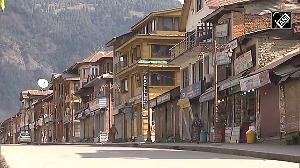 Born in Zurich, Switzerland Mark Faber got his PhD in Economics by age 25. He has worked in all the major money centres of the world from New York to Hong Kong. CNBC-TV18 caught up with investing guru Marc Faber. Excerpts from an interview:
Born in Zurich, Switzerland Mark Faber got his PhD in Economics by age 25. He has worked in all the major money centres of the world from New York to Hong Kong. CNBC-TV18 caught up with investing guru Marc Faber. Excerpts from an interview:
When you were growing up, you were a surgeon's son -- what propelled you to study economics?
Actually at that time I was skiing for the Swiss national team and I did not really know what to study, but I knew that Economics was a relatively easy thing to do. It took only four years.
What did they teach you - what was the world like in the 1960's - and how has your worldview changed through the lenses as an economist?
I think in the 1960s the world had far fewer opportunities; we still had the cold war, the Vietnam War was on and as an investor one couldn't invest in countries like China or India or Taiwan or Indonesia. So the world was much more limited in terms of investment opportunities and even the total credit take -- 3:32 was much lower as a per cent of the economy than it is today.
In other words, that time people had relatively high incomes but the asset values were relatively low. Today in real terms, in the western world, people have relatively low incomes and asset values are high measured by the Dow Jones or by housing prices.
How was the first impact of Asia on you? Being a disciplined Swiss -- was it chaotic, disorganised?
No, not really. I arrived in Hong Kong in the 1970 and Hong Kong Chinese were very hardworking but of course what strikes me today is, how poor Asia was in 1973; if one went to Taiwan, Korea or Singapore, these were very poor societies and if one looks back at the last 30 years -- the progress that has been achieved is just mind boggling.
All I can say is that history is accelerating in terms of speed of change. If one looks at how Bangalore has developed in the last 10 years or how Shanghai has developed in 10-20 years time, there will be changes in the world and in Asia that nobody can really comprehend today.
At that time steel and shipyards were the talk of Asia?
Yes, shipping was a big thing in the 70s. Everybody was building steel plants and cement but in the 1970s, very few people were interested in investing in Asia. Some American institutions had few investments in Japanese stocks (like the Templetons of the world) but aside form British institutions that bought some shares in Malaysia, Hong Kong and Singapore, there were practically no funds of flows out of America and Europe into Asia.
All the flow that time was from Asia into US stocks and also into gold, silver and other precious metals. Then in the late '80s the flow began into Asia from the western world.
There are great myths built about the market and you spent the better part of your life adding to the truths and destroying the myths - one of the great myths is that stock market always goes up in the long run?
That is very difficult to tell. One could argue that in the long run most things will appreciate in value, but the problem is that most companies live only 30 years and then they die. In other words, they go bankrupt.
So when people talk about stocks going up in the long run, one would have to constantly re-balance one's portfolio. One could also argue that stocks go up sometimes but they fall as a result of inflation adjusted or in other words against another currency or gold.
In the long run, it is also said that it is never different -- there is a myth that every bull market will say it is different this time -- is it right?
I think in every asset mania what then happens is that if asset price or a stock or real estate have gone up for a long time, one will find university professors who write books and say why real estate goes up or why stocks always appreciate and so on. The fact is simply that, markets move up and down and that will never change.
The myth that a bull market contains the seed of destruction to the next bear market.
I suppose the longer a bull market lasts, the more likely it is that it will end in a colossal bubble because if you consider that there are in this room several asset classes: real estate, stocks, bonds, commodities, etc.
And say stocks always go up more than commodities, then obviously all the money will move into stocks because they will outperform other assets and so once all the money moves into stocks, then obviously you will end with the whole room only owning stocks and thus the bubble.
And frightfully expensive P/E ratios?
Yes exactly, but the beauty of the bubble is because it attracts so much money, it will leave other asset prices depressed compared to the bubble sector. So if one looks at the 2000 bubble, we had the bubble in the TMT sector but we did not have a bubble in the steel stocks or commodity related shares such as oil companies and that is where the value was at that time.
So the great truth is that every crisis creates an opportunity?
Yes, that is for sure, but not necessarily where the crisis occurs. Every bubble also creates an opportunity because rise in one sector creates an undervaluation somewhere else. Since the year 2002 and since Mr Alan Greenspan embarked on this highly expansionary monetary policy; all asset prices have gone up, bond prices have rallied, commodity prices are up, stock prices are up and real estate is up and this is across the world.
Today it is difficult to find something that is distressed; I think there is only relative value at the present time.
You say in your books -- "don't listen to analysts; listen to markets" -- could you explain that?
I think analysts are frequently not very objective because they work for large investment banks and have a vested interest. It is very seldom in life to find someone who is in real estate who is negative about real estate or an art dealer who will tell you art prices will go down or a stock broker who will tell you stocks will go down.
I am sceptical about analysts that specialise in one sector because they have vested interest that that sector remains popular and actually attracts a lot of money. It is the same as a fund manager -- he cannot turn and tell his investor I don't think you should invest in India if he is an Indian fund because if his investors leave his fund, then he has no business left.
So these types of people with self-interest have a tendency, whether they are at heart optimistic or not, but at least to tell the public that they are optimistic.
You wrote a paper on life cycle of emerging markets. How relevant is that today and over the years what has been your experience of how the emerging markets behave?
I think all markets go through stages whether they are in a phase Zero which would be defined as a phase, where there is really no interest whatsoever in that asset class. It could be Latin American shares in the late 1980s after Latin America had gone through very high inflation rates, or it could have been Japanese shares, recently in 2003 after 14 years of bear market, there was very little interest in Japanese shares.
In India, we had several cycles and until three years ago, foreign investors have shown very little interest in Indian shares. Then there is usually a catalyst, which leads to some improvement in the economic conditions and financial conditions of that country, and then you have a bull market, which usually ends in a bubble.
Nobody knows whether in India, the bull market is ending now with this new high, or whether we will go to 15,000.
How would you judge the top?
I would say that frequently it is easier to identify a major low. When lows occur, you have very often have a lengthy base-building period during which a commodity, or a stock trades sideways for many years, and then there is a breakout on the upside.
With the market tops, a bubble is a bubble and you hardly know at what point it will break. If you take Nasdaq, it could have been broken at 4000 a year earlier, or at 5000 in March 2000, or at 7000, who knows, it was exaggerated any way. To identify tops is easier once the top has already occurred, than ahead of time.
A lot of people say that you get the trend right, but the timing wrong. Is it important to get both of them right?
I don't think I always have been pessimistic. I have been involved in fund management as a chairman of a variety of funds. I have written a lot about emerging markets and promoted emerging markets over the last 25 years.
Concerning the timing, I am the first one to admit that to press a button and say this is the low and press it again and say this is the peak, is very difficult. I am not sure if anyone has successfully managed to do that. I always look at what is the risk and what is the reward of an investment.
If you can find an asset class or stock market that is inexpensive I am prepared to wait until it moves. People criticized me in 1999, when I said buy gold now because it has gone down for 20 years, it may be an opportunity to buy it and it started to move in 2001. For two years you are sitting without any reward but then it went up significantly since then.
How important is it to understand the role of the Federal Reserve to understand the world economy?
I think it is very important to understand the fact that we have a central banking system where the central banks can indicate, theoretically drop dollar bills from Helicopters. You won't be able to do that because all American helicopters are in Iraq. But they can print money, that is a fact and they can flood the system with liquidity.
Then you have to find a measurement of inflation. We measure inflation by rise in money supply. It would be wrong to think that the inflation is just consumer price increases. Inflation is a loss of purchasing power of your currency, dollar or Rupee.
It can manifest itself by rise in consumer price but it can also manifest itself by a loss of purchasing power of money against real estate, or against stocks and real estate.
Americans have fewer passports than their mortgages, so clearly they don't care about dollar depreciating?
The difference between America and an emerging economy is that, the emerging economy usually borrows in a hard currency. They have difficulties in borrowing in local currencies. So they borrow in dollars or in yen.
So when the current account deficit balloons, it comes to a currency crisis and depreciation of currency and then an adjustment in the economy takes place with consumption slumping and then the current account balance will be retraced.
In the case of the US, they can print money as much as they like and keep current account deficit ballooning and also have a very negative net asset position and it doesn't hurt them because their borrowings are in dollars.
How long will the foreign governments, the Chinese, the Japanese continue to subsidies these huge deficits. What are the implications when they pull from the T-bill auctions?
It is conceivable that we have a dollar stand and dollar depreciates in value. Since the year 2000, the stock market has deprecated against the price of gold and dollar has depreciated against the price of gold.
The gold price has gone up in dollar terms and that could continue for quite some time. I think eventually the world will be very apprehensive to hold dollars and will rush into assets.
What is the public enemy No 1 in your book, would it be inflation, or deflation?
In my book public enemy No 1 are the central banks. I think the world will be much better off under a gold standard. Other than that, I think the asset inflation is much more dangerous than consumer price inflation because asset inflation is driven by a huge credit bubble. Then asset prices become very expensive and when asset prices go down it leads to recession.
So the Central Banks will support asset prices and see to it that they keep on going up. So they will inflate more and more and eventually you will come to an economic collapse.
Can the dollar fall alone, or would it be the dominos effect, which would take down other markets?
In my opinion, the dollar will depreciate mostly against the gold. In the long run, what you will see is the standard of living in America will decline very significantly compared to the standard of living in Asia.
And the stock market capitalization of US, which is now 52% of the world's stock market capitalization, which will decline to somewhere between 20% and 30% and the Asian stock market capitalization will rise to between 20% and 30%, possibly 50% of the world.
For more such reports, log on to www.moneycontrol.com







 © 2025
© 2025